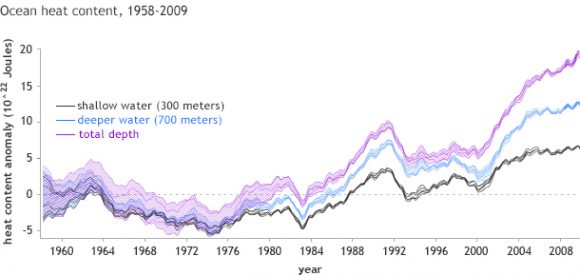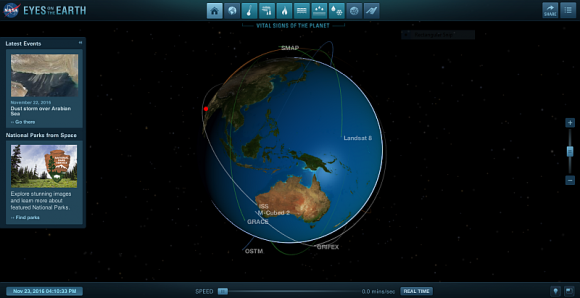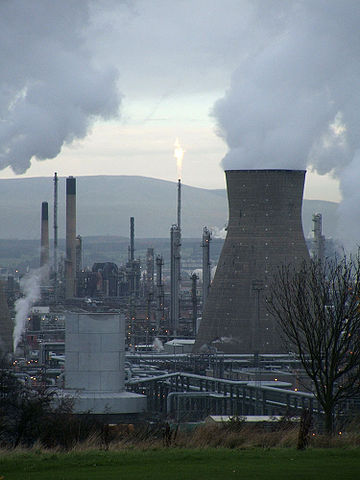A reprieve from Global Warming? A hiatus? That would be nice, wouldn't it? But in this case, a hiatus is not quite what it seems.
Everybody knows that global warming is partly caused by human activities, largely our use of fossil fuels. We understand how it works and we fear for the future. But there's been a slowdown in the global mean surface temperature increase between 1998 to 2013. We haven't lowered our emissions of greenhouse gases (GHGs) significantly during that time, so what happened?
A new multi-institutional study involving NASA's Jet Propulsion Laboratory (JPL), the National Oceanographic and Atmospheric Institute, and others, concludes that Earth's oceans have absorbed the heat. So instead of the global mean surface temperature rising at a steady rate, the oceans have taken on the job as global heat sink. But what's the significance of this?
"The hiatus period gives scientists an opportunity to understand uncertainties in how climate systems are measured, as well as to fill in the gap in what scientists know." -Xiao-Hai Yan, University of Delaware, Newark
In terms of the on-going rise in the temperature of the globe, the hiatus is not that significant. But in terms of the science of global warming, and how well we understand it, the hiatus gives scientists an opportunity.
The new paper, titled "The Global Warming Hiatus: Slowdown or Redistribution?" grew out of the U.S. Climate Variability and Predictability Program (CLIVAR) panel session at the 2015 American Geophysical Union fall meeting. From those discussions, scientists reached consensus on three key points:
- From 1998 to 2013, the rate of global mean surface warming slowed, which some call the "global warming hiatus."
- Natural variability plays a large role in the rate of global mean surface warming on decadal time scales.
- Improved understanding of how the ocean distributes and redistributes heat will help the scientific community better monitor Earth's energy budget. Earth's energy budget is a complex calculation of how much energy enters our climate system from the sun and what happens to it: how much is stored by the land, ocean or atmosphere.

This graph shows the yearly global ocean heat content. The dashed line shows the 1958-65 average. Image: Balmaseda et al., 2013
The paper is a reminder that climate science is complex, and that the oceans play a big part in global warming. As Yan says, "To better monitor Earth's energy budget and its consequences, the ocean is most important to consider because the amount of heat it can store is extremely large when compared to the land or atmospheric capacity."
"..."arguably, ocean heat content -- from the surface to the seafloor -- might be a more appropriate measure of how much our planet is warming." - from the paper "The Global Warming Hiatus: Slowdown or Redistribution?"
The team behind this new research suggests that saying there's been a hiatus in global warming is confusing. They suggest "global warming hiatus" be replaced with "global surface warming slowdown."
There's a danger in calling it a "global warming hiatus." Those opposed to climate change and who think it's a hoax can use that term to discredit climate science. They'll claim that the "hiatus" shows we don't understand climate change and the Earth may have stopped warming. But in any case, it's the long-term trend—change over the course of a century or more—that defines "global warming," not the change from year to year or even decade to decade.
There's much more to learn about the oceans' role in global warming. Research shows that some ocean areas absorb heat much faster than others. But whatever the fine detail of it is, there is broad agreement in the scientific community that the global surface warming slowdown was caused by an increased uptake of heat energy by the world's oceans.

A screenshot from the "NASA's Eyes" app. The app allows anyone to check Earth's vital signs. Image: NASA/JPL
NASA uses a lot of tools to monitor the Earth's temperature. For an interesting look at the Earth's vital signs, check out Nasa's Eyes. This easy to use visualization tool lets you take a closer look at the Earth's temperature, CO2 levels, soil moisture levels, sea levels, and other things.







No comments:
Post a Comment